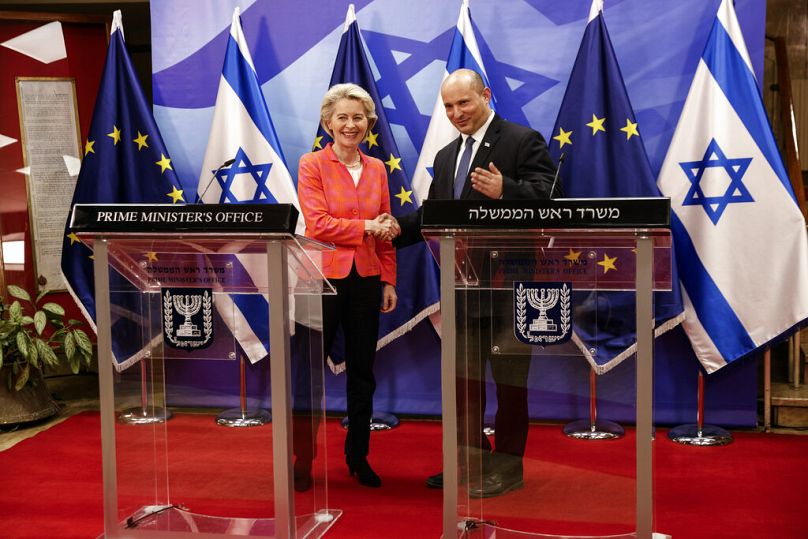Any overreaction would only play into the right wing’s hands, which already portrays the EU as an actor antithetical to Israel’s national interest., Shlomo Roiter Jesner writes.
The outcome of Israel’s fifth election in under four years has had many in the European Union concerned.
Referred to as the victory of Israel's extreme right, Benjamin Netanyahu saw himself return to the prime minister’s office in November of last year after elections in June 2021 saw his 12-year streak as PM come to an abrupt end.
Building a solid 64-seat coalition in the Knesset, Netanyahu has managed to establish an absolute majority with the help of his long-term ultra-orthodox partners along with the newly established right-wing Religious Zionism party.
This is arguably the strongest coalition — percentage-wise and ideologically — that Israel has seen in years.
Claims that the coalition will fall apart or that it is only a temporary step in Netanyahu’s quest to form a more moderate government are wishful thinking.
And while concerns over what this government might be capable of are well-founded, many are still overplayed.
Instead, it might be more prudent to think about potential opportunities for EU foreign policy engagement with Israel’s government because, as things stand, it is more than likely there to stay.
Promises to far-right voters are largely symbolic
The EU is rightfully concerned over a number of primary issues. Concerns over the government’s proposed judicial reform plan have been at the top of the list, which would see Israel’s High Court capable of exerting significantly fewer checks and balances over the country’s executive branch.
EU officials have kept surprisingly silent on the issue, preferring to see how the legislation, which is currently being renegotiated in light of widespread domestic opposition, plays out prior to commenting.
Despite claims to the contrary, the annexation of the West Bank — another concern high on EU decision-makers’ agendas — is not a realistic prospect.
No matter how right-wing his government, Netanyahu is, above all, an international statesman who understands the full implications of such a move, both against his relationship with the current US administration and Abraham Accords nations.
It is exactly this practical approach which saw Netanyahu step back from the proposed judicial reform plan, which brought the country out in droves to demonstrate in Israel’s biggest demonstrations since the 2011 cost of living protests.
While progress will undoubtedly be made to “lay the groundwork” for annexation and appease a right-wing electorate, the EU or the UN overreacting to such largely symbolic steps would be counterproductive.
Such was the case with the UN vote around the new government’s election, which requested an opinion from the International Court of Justice on the legal status of Israel’s “prolonged occupation, settlement and annexation of the Palestinian territory occupied since 1967.”
The trouble on Temple Mount
An example where this type of symbolic "groundwork" is at its most apparent is the Temple Mount, a bone of contention where even a simple change in the status quo can inflame tensions across the entire West Bank.
Netanyahu's right-wing coalition partner Itamar Ben Gvir has been a long-time advocate of increased Jewish rights on the hill in Jerusalem's Old City, considered holy by Jewish, Muslim and Christian communities alike.
With the High Court of Justice in the past affirming the right of Jews to pray — setting as the only caveat the police’s ability to limit this due to public security concerns — the status quo can be expected to almost certainly change with Ben Gvir as Minister of National Security.
This has already been apparent over the course of the Passover holiday, when hundreds of Jewish worshippers ascended the Mount, despite recent riots and the continued barricades in the Al Aqsa Mosque.
The ascension of Jewish worshippers under similar security circumstances in previous years would have been unthinkable.
It has also been apparent from the heavy-handed reaction the security services have taken against challenges from agitators on the Temple Mount.
Although some of the roughly 400 people who barricaded themselves inside the mosque and assaulted the Israel Police with fireworks, sticks and stones, forcing the security forces to enter the premises, might have been extremists, even Police Commissioner Kobi Shabtai was made to admit that he was unhappy with footage that surfaced of violence employed at Al Aqsa.
Extreme policing tactics have undoubtedly been encouraged by the approach of Ben Gvir, responsible for overseeing the Israel Police in his capacity as minister.
Ben Gvir has called for a more heavy-handed response to security challenges, including those posed by Israeli demonstrators in recent anti-judicial reform protests.
Taking a page out of Biden's book
Again, the EU should be wary of reading such a change as something it is not — such as, for example, a denial of Palestinian rights to access the Temple Mount and Al-Aqsa.
Despite Palestinian and even Jordanian claims to the contrary, the status quo has not been violated, and any overreaction would only play into the right wing’s hands, which already portrays the EU as an actor antithetical to Israel’s national interest.
US President Joe Biden, although recently relatively disengaged from the Middle East-related issues, is well experienced in handling Netanyahu government crises from his time in the Obama administration.
EU decision-makers would do well to learn from his ability to walk a fine line between what is perceived as strategic criticism and delicate leverage applied.
With regard to the plans for judicial reform, Biden, for example, expressed concern over the prospects for democratic backsliding in Israel, and even dispatched Secretary of State Anthony Blinken to the region to hammer the point home.
Yet, he refrained from taking any further steps on the issue despite calls to react more firmly.
Concerns have also been expressed over the representation of Israel’s Arab population in the Knesset.
Despite challenges posed by the right, Israeli Arabs are represented by a total of 10 legislators in the Knesset. And indicatively, the threat posed by the right wing increased the percentage of Arab voters by around 8.5% in the recent election.
EU's own policy towards the far-right is that of appeasement, anyway
European decision-makers would do well to see them, as well as other more moderate members of the opposition, as strategic partners while not ostracising the government itself.
Danish Member of the European Parliament (MEP) Asger Christensen’s approach was very instructive in this regard, saying, "It is Israel's decision [to shift to the far-right]. We will cooperate with that decision."
Even if Israel has a far-right government, he added, "We want to expand cooperation with Israel in Europe”.
Such a policy of continued, potentially critical, engagement would be very much in line with EU policies towards previous governments, such as the most recent Benett-Lapid coalition.
This was treated as a perfectly legitimate government, with EU Commission President Ursula von der Leyen even paying the notoriously hawkish Naftali Benett a visit to Jerusalem in June of last year.
This was despite the Ra’am party’s key position in the coalition. Ra’am, also known as the United Arab List, founded by convicted terrorist Sheikh Abdullah Darwish, remains affiliated with Israel’s Islamic Movement and is openly homophobic.
A policy of engagement would also be very much in line with the EU’s own policy towards right-wing governments in the EU — a pragmatic approach considering how the far right has become increasingly stronger, as was seen from the recent Italian and Swedish elections.
Ignoring, or worse, boycotting, Israel’s new government, no matter how right-wing or extreme, is precisely the move many in the incoming government anticipate in order to both justify their anti-European narrative and policies which emphasize why “Jewish” interests must be placed above all else.
Shlomo Roiter Jesner is the president and co-founder of the Cambridge Middle East and North Africa Forum. He is also the CEO of London-based F&R Strategy Group, a geopolitical consultancy at the intersection of politics and business.
At Euronews, we believe all views matter. Contact us at view@euronews.com to send pitches or submissions and be part of the conversation.















